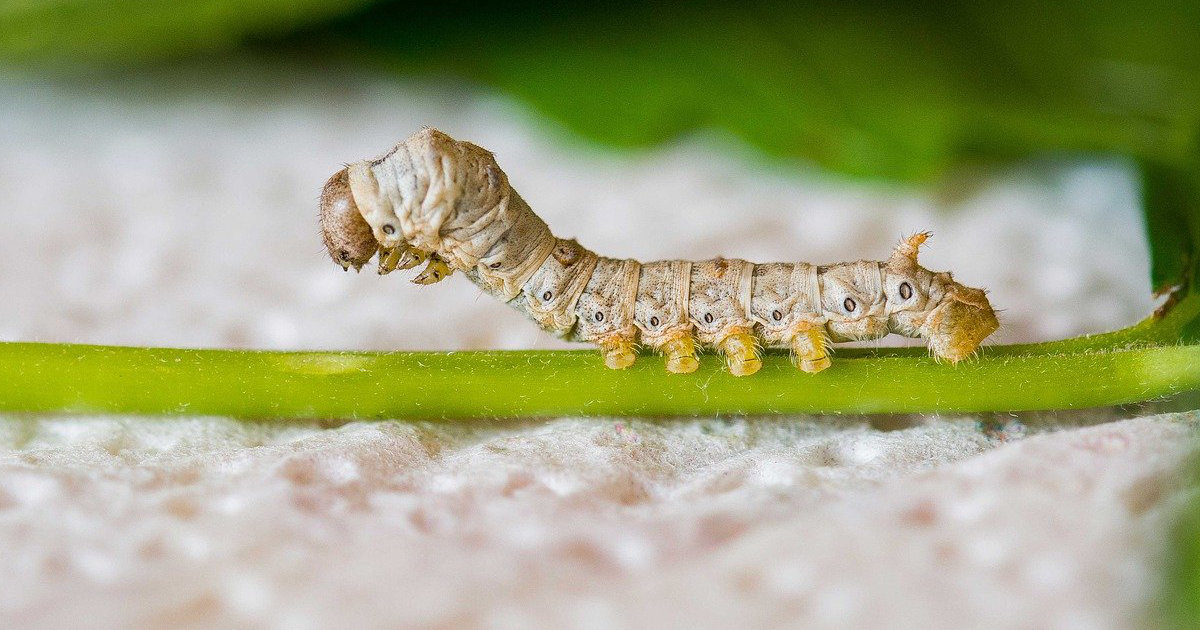Can Bearded Dragons Eat Silkworms?
Can bearded dragons eat silkworms? Are silkworms for bearded dragons OK? Bearded dragons can be fed silkworms regularly – read on for more information

Last Updated: January 10th, 2022
By: Steve
Table of Contents
Can bearded dragons eat silkworms? Are silkworms for bearded dragons OK? Bearded dragons can definitely eat silkworms regularly. They’re great for babies and juveniles as they’re soft and have a good protein and calcium amount.
What Are Silkworms?
Silkworms are the larval, or caterpillar stage of the Bombyx Mori moth.
It originates from China and is an important insect for humans because it produces silk which is used to form the cocoon of the silkworm when it transforms into the moth. The cocoon is made up of one long silk thread which varies in length from 300 to 900 metres.
Silkworm pupae are considered a delicacy in some areas of Asia. They’re also an excellent form of Bearded Dragon insect food – which is of course why we’re interested in them here.
Can Bearded Dragons Eat Silkworms?
Bearded dragons most certainly can eat Silkworms. They have a good moisture content and a good calcium and protein content too. They’re excellent for baby bearded dragons because they’re small enough to be easily digestible. They’re also good for adults but being that bit smaller they can be quite expensive for adults as they need quite a lot of them to be satisfied.
Silkworms are only bred in captivity, they no longer exist in the wild. They’re bred purely for their silk creating capability or as feeder insects for various other creatures, including bearded dragons. They only eat Mulberry leaves so this can make keeping them for long periods quite awkward – unless you can get your hands on some Mulberry leaves.
Of course if you cannot find Mulberry leaves to feed your silkworms on, they will die eventually. Dead silkworms are of no benefit to a bearded dragon because they begin to lose all their nutrients when they’re dead. And bearded dragons generally don’t eat dead insects willingly anyway.
Mulberry trees and bushes can be grown in temperate environments such as the UK though and having a few of these in the garden could be enough to allow you to feed silkworms for a few weeks if you wanted to keep the alive longer.
Advantages of Silkworms For Bearded Dragons
Disadvantages of Silkworms For Bearded Dragons
How Should I Feed Silkworms To A Bearded Dragon
Silkworms are relatively slow and quite small creatures. They’re best fed in a dish or bowl and the bearded dragon be allowed to catch them from within the bowl themselves. But you can use your fingers if you prefer, or even tweezers or tongs if you’re really against the idea of handling them.
They don’t have sharp teeth or claws or anything with which to hurt you, or your bearded dragon.
Silk moths are generally not fed to bearded dragons though we can’t find anything to suggest they can’t be – perhaps they’re just not very tasty.
How Many Silkworms Should I Feed My Bearded Dragon?
Adult bearded dragons can be fed Silkworms once or twice a week. We recommend mixing up the diet a bit with other bugs just to provide some variety, but silkworms can be considered a staple food item.
Baby bearded dragons can also eat silkworms and this would be one of our recommended food for babies.
To gauge how many to feed, give your bearded dragon as many silkworms as they’ll eat in about a ten minute sitting. They can be put in a bowl and just picked off one (or two) at a time.
Can I Feed Dried Silkworm To My Bearded Dragon?
Dried silkworm available online generally come in the form of the pupae without the silk wrapped around it. We don’t generally agree with feeding any dried insects to bearded dragons as they tend to have less nutritional value than their live counterparts.
Dried bearded dragon insects also, by definition, contain no water. Many bearded dragons won’t drink water from a bowl or dish without some fairly significant prompting. Ordinarily this isn’t a problem because they’ll get water from their insects, but if you’re feeding dried insects then this isn’t happening. Bearded dragons can become dehydrated which leads to all sorts of potential problems such as kidney issues.
Nutritional Data For Silkworms For Bearded Dragons
| Nutritional Item | Content |
|---|---|
| Moisture (%) | 82.7 |
| Fat (%) | 1.10 |
| Protein (%) | 9.30 |
| Ash (%) | 1.1 |
| Calcium (mg/kg) | 177 (0.018%) |
| Phosphorus (mg/kg) | 2370 (0.24%) |
| Potassium (mg/kg) | Unknown at present |
Summary
It’s fair to say that asking the question “Can bearded dragons eat silkworms” or “Are silkworms for Bearded Dragons a good idea” then the answer is definitely a strong and resounding yes. As insects for bearded dragons go these are without a doubt among the best.
Silkworms are easy to keep, clean, quiet and nutritious. They can be fed on silkworm food which is commercially available, often as a powder or a ‘chow’. Silkworm Food – Silkworm Store is one such place. Silkworm food as chow can be kept for up to a month in the fridge and the powder lasts up to a year.
Frequency: Babies – staple, regularly (twice daily). Adults – staple, regularly (once or twice a week).
References / Credits
1: The Worm Lady Canada – Live feeder nutrition facts and Exotics nutrition info (thewormlady.ca)
Featured Image by Paolo Zerbato from Pixabay
